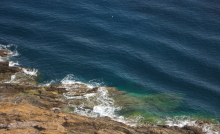On 28 October 1940 at 2:50 am, the Italian ambassador in Athens, Emanuel Grazzi took Benito Mussolini’s message to the Greek leader General Ioannis Metaxas. Metaxas was awoken and confronted with a written ultimatum for Italian troops to enter Greece.
Metaxas responded ‘this means war’ (in French “Alors, c’est la guerre”, French was the diplomatic language of the time). For Greeks, this day is commemorated as OXI day. ‘Oxi’ (pronounced “ō-hē”) is the Greek word for ‘no’. The day is a public holiday in Greece and celebrated by Greek communities world wide.
Jealous of Hilter’s conquests, Mussolini’s impetus for the invasion was to accomplish his own military success. Mussolini boasted prior to the invasion that he would crush Greece.
Greco-Italian War 28 October 1940 to 23 April 1941:
At 5:30 am on 28 October 1940, the Italians crossed the border from Albanian into Greece. Greece was at war with the Fascist government of Italy under Mussolini. Shortly after, Metaxas addressed the Greek people:
“The time has come for Greece to fight for her independence. Greeks, now we must prove ourselves worthy of our forefathers and the freedom they bestowed upon us. Greeks, now fight for your Fatherland, for your wives, for your children and the sacred traditions. The struggle now is for everything!”
THE BATTLE OF PINDUS:
28 October – 13 November 1940
The first Italian offensive of the war against Greece was fought in the Pindus Mountain range in Epiros and Macedonia. The Italians wanted to capture the strategic mountain passes of the Pindus Mountains.
The Pindus Mountain range extends 93 miles across Greece, 100 miles south of Albania. The range consists of high, steep peaks, with many deep canyons and a landscape of limestone where erosion created sinkholes, fissures, ravines, underground streams and caverns. The maximum elevation is 8,650 feet at Mount Smolikas. The mountain range is called the Spine of Greece since it extends down to the north of the Peloponnese.
The Italian forces moved from southern Albania into Greece with it’s 3rd Alpine Division Julia. Julia was a light infantry division which specialized in mountain combat and consisted of highly decorated and elite mountain corps. Julia was considered to be one of the best in Italy. The Italians were better armed with weapons and machinery.
The Greek force in the area was the Pindus detachment under Colonel Konstantinos Davakis containing a force of 2,000 men. Davakis divided his troops into three sectors. Davakis was a Spartan. His division was the first Greek unit to encounter the Italians.
Under heavy rain at 5:30 am, the Italian forces attacked the three sectors. The Greeks fought courageously and against greater forces. The Julia division succeeded in pushing through Davakis’ central sector. The Italians moved to the Greek town of Metsovon and their objective was to cut the Greek forces in two, those in Epirus from those in Macedonia.
The Greeks were mobilized into small coordinated units which proved to be a strong resistance and within a few days the Julia division was surrounded. On 8 November, General Mario Girotti of Julia admitted defeat. The rain, snow and wind along with the steep mountain slopes aided the Greek troops in defending Greece. The Greeks pushed the Italians back to the border in a complete victory, even advancing deep into Albania. The Italian loses were 5,000 dead.
Not only weather and terrain aided the Greek forces, but also the local civilian population. The local women provided crucial assistance to the Greek victory. Women, old and young, carried guns, food, clothing and supplies on their backs to the troops over the mountain trails.
Davakis was wounded 2 November 1940 but survived. He was arrested in December 1942 by the Italian occupation authorities under suspicion of working in the Greek Resistance and was shipped to a POW camp in Italy. However the ship carrying him was torpedoed and sank. His body was recovered by local Greeks and buried. After WWll ended, he was transferred to Athens for reburial.
THE BATTLE of ELAIA-KALAMAS:
2 − 8 November 1940:
The Greeks while outmanned in both numbers and equipment, created a defensive line along the Elaia-Kalamas river in Northern Greece 19 miles south of the Greek-Albanian border. The Greeks had no tanks and their arms and equipment were from WWI.
The Greek 8th Infantry division in the area were commanded by Major General Charalambos Katsimitros. Katsimitros understood that the mountainous and marshy terrain negated the Italian superiority in men and armour. Opposing instructions from the Greek General Staff, Katsimitros chose to set his troops in a defensive line along the Elaia-Kalamas river. The Greek Plan was to initiate a slow retreat towards this line. This decision contained the Italian invaders and provided the necessary time for Greek enforcements to arrive. The Italian light tankettes and medium tanks could not navigate the terrain. Even though the Italians had superior numbers and equipment, the Greek defensive line remained unbroken.
The Greek army counterattacked and repelled the Italians back by mid-December and into Albania. Katsimitros led his division into Albania. The Greek army eventually occupied a quarter of Albania moving 18 to 49 miles deep into Albanian territory, holding down 530,000 Italian troops.
In March of 1941, trying to expel the Greeks from Albania, Mussolini personally supervised a counterattack. It failed.
The Greeks fought for six months against the Italians and repelled the Italian advance into Greece.
Winston Churchill said,
“Our allies the Greeks has seen off the Italian army. Hence we will not say that Greeks fight like heroes, but we will say that heroes fight like Greeks.”
